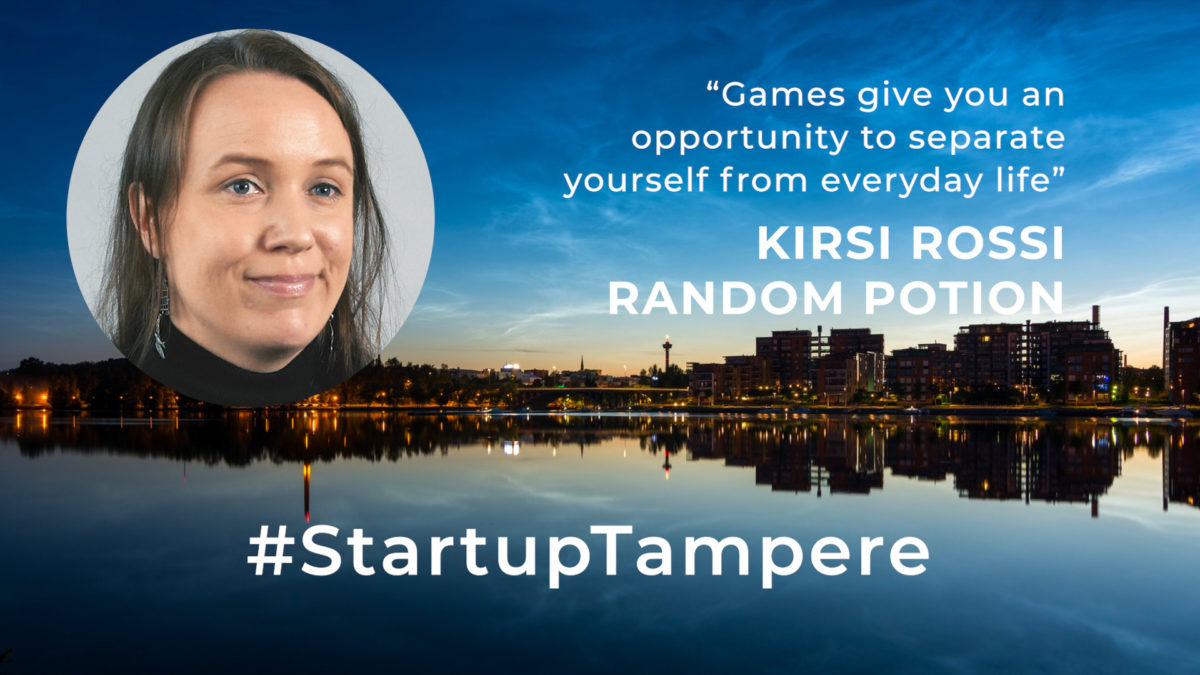”Games give you an opportunity to separate yourself from everyday life.”
18.11.2020
Random Potion brings the familiar vibe of tabletop RPGs into digital gaming. Multiple new game concepts are currently under development, supported by the expertise gained from the studio’s first release.
“Tabletop role-playing is about creative storytelling,” says CEO Kirsi Rossi, “and the stories you tell may still be memorable even years later. However, tabletop role-playing games always require a physical space, time, and commitment.”
Random Potion’s first digital release was meant to be as close as possible to a tabletop role-playing, which entails a regular gathering at someone’s residence, for example once a week.
“We created a tabletop RPG vibe by emphasising short adventures,” tells Rossi. “We aimed for alternative forms of implementation, and – for example – visualised the dice rolls one would know from tabletop.”
According to Rossi, the most important function games have is to give people an opportunity to separate themselves from everyday life.
“It is kind of like seeing a film or going to the gym, or meeting up with friends. They are good ways to escape reality for a while, by moving into another world.”
Random Potion wants to make story-driven games which offer enriching experiences. Many of the studio’s game concepts consist of multiple short sessions, which are easy to schedule.
“It is sometimes hard to find time for tabletop RPGs,” says Rossi, “and in some cases your gaming group may have scattered to live in different cities over the years.”
She adds, “Of course, some of our concepts are for single-player games, but they are also story-driven.”
The studio’s target groups are primarily located in Europe and North America, but the digital nature of their games make them available to be played all over the world.
Releasing a Debut Was a Learning Experience
For Rossi, finding a publisher for their first game was Random Potion’s most significant achievement thus far. The concept had already been in development when the studio was founded in 2017, and the finished game was published in 2020.
“Some investors require you to have published at least one game before they even agree to negotiate,” tells Rossi. “Having a release is also a good indication that we are capable of realising our ideas, and doing so on a pre-determined schedule.”
According to Rossi, their debut received some criticism, and its sales remained modest. However, the project proved to be instructive, and left the team with a lot of valuable experience.
“We learned much about many things,” explains Rossi, “such as the importance of knowing your target group, and setting the right kinds of expectations.” She further adds that when working on a long-term project, it is important to maintain your vision. The big picture may well break down when you shift focus to individual factors.
“Each aspect of the game should support your vision and drive it forward,” Rossi sums up the issue.
An Entrepreneur Needs Time and Support
In Rossi’s opinions, one of the most important factors in entrepreneurship is networking. A community is a source of peer support in times of difficulty.
“Many other start-up entrepreneurs have gone through the same circumstances, and for me, at least, sharing these experiences has been fruitful and worthwhile. Networks can also be a good source of advice.”
“An entrepreneur must allot enough time for their work,” says Rossi. “Start-ups operate much faster than large companies. Sometimes it comes as a surprise how long it takes to make decisions on investors.”
She also reminds entrepreneurs to take time off and relax. “Being an entrepreneur can easily come to mean that you work 24/7. Having enough time free time and holidays brighten your vision, because when you are tired, even simple issues become hard to deal with.”
Tampere Is Good for Networking
According to Rossi, from an entrepreneur’s perspective, Tampere is a favourable location.
“Tampere is a popular city and it has a good reputation,” lists Rossi. “There are plenty of creators here, and it is easy to draw in in new talent. Having a university programme in the field also plays a large role.”
She also adds that distances to other cities, such as Helsinki, are quite optimal. Housing is cheaper, and it does not take as long to commute.
“Living in such a conveniently sized city makes it easy to network,” Rossi concludes. “You can get into the local start-up groups and game industry community very quickly.”
Building Tampere’s startup ecosystem together
6Aika – Ecosystems of growth: enabling the growth of companies through collaboration of the Kuutoskaupungit cities
The project supports the access of growth-oriented companies to suitable networks and services supporting research and product development activity. The project is implemented by the six biggest cities in Finland: Helsinki, Espoo, Vantaa, Tampere, Turku and Oulu, and the Council of Tampere Region. The project is based on the idea of the cities’ active role in supporting the innovation activities of companies and the related support networks.

